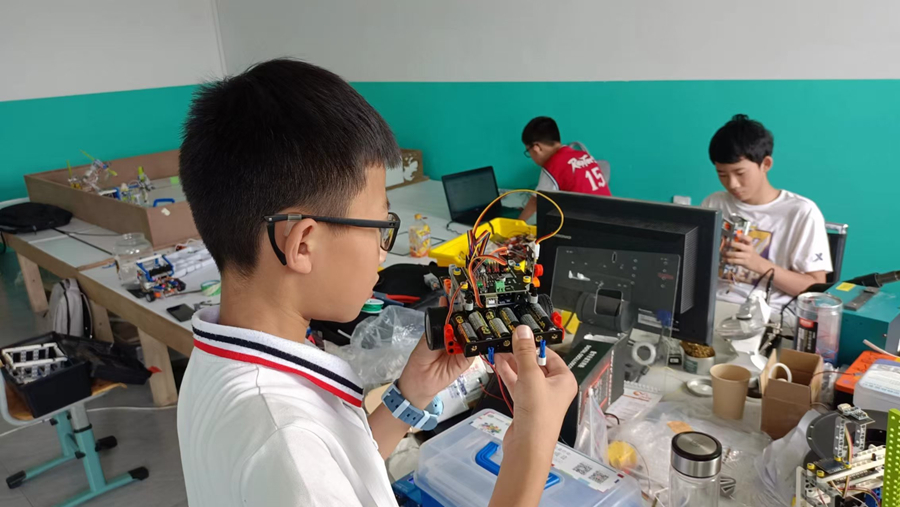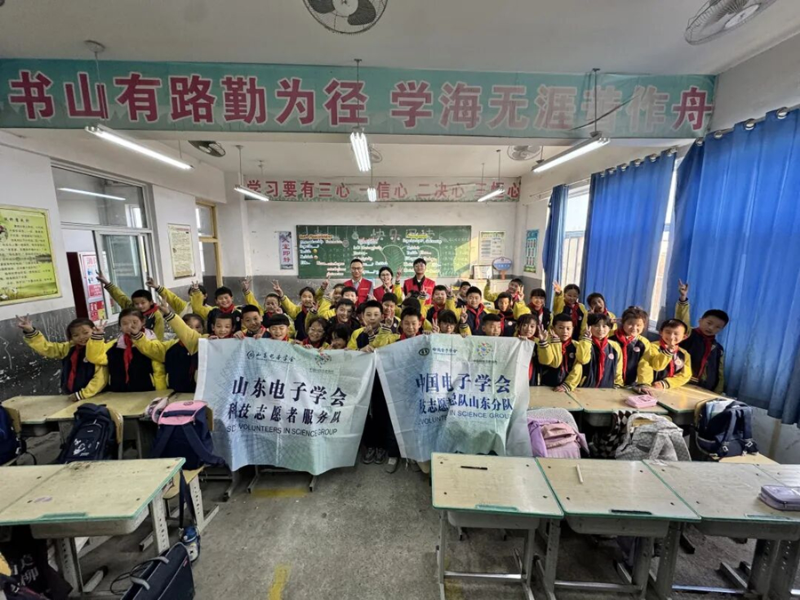“Candlelight Outreach” bridges gap in rural science education
The success of China's efforts to cultivate scientific literacy can be seen by the transformation of learning in its rural areas, where students are discovering the fascinating world of modern science and technology. This is the goal of the "Candlelight Outreach" initiative, a public welfare project launched in 2012 by the Chinese Institute of Electronics (CIE).
"Candlelight Outreach" volunteers pose for a group photo with local school students. [Photo provided to China.org.cn]
Founded by Sha Youwei, a senior information technology teacher and member of the CIE Popularization Committee, the program aligns with the National Scientific Literacy Action Plan (2021-2035) and the National Rural Revitalization Strategic Plan (2018-2022), utilizing CIE volunteers to promote modern science education in rural schools through robotics programming and science experiments.
To date, the initiative has achieved extensive reach, delivering over 450 science classes to nearly 40,000 students in 192 schools across 99 county-level administrative regions. Beyond these numbers, the project's core philosophy is to provide a learning environment that encourages application and understanding. By framing lessons as problems to solve, "Candlelight Outreach" is fostering students' motivation and confidence.
Volunteers are the heart and soul of the project, and are described as passionate "lantern bearers." Their composition is diverse: university professors and students in fields such as computer science and electronic engineering contribute academic rigor; professional engineers bring industry expertise; instructors from science museums offer engaging, interactive explanations; and retired experts and teachers provide deep experience. The primary motivation among the volunteers is a desire to give back and pass on their knowledge. One engineer from a Beijing-based tech company noted finding greater professional satisfaction in seeing children cheer over successfully running code than in completing a commercial project.
The most transformative aspect of "Candlelight Outreach" is its problem-based learning (PBL) model, which fundamentally shifts the children's perception of learning from a passive task to active exploration. This change occurs on three levels. First, it reconstructs the purpose of learning, moving from understanding "what" something is to "why" and "how." By presenting challenges, such as making a small car that can automatically avoid obstacles, students are forced to actively seek knowledge as a tool for creation. Second, it shifts students attitude regarding failure away from fear of making mistakes to developing the courage to try. Since debugging and structural collapse are normal in programming and building robots, students learn that failure is a valuable step toward success, fostering a crucial growth mindset. Third, it transforms learning away from the individual and toward community-minded collaboration. Team projects require students to communicate, negotiate and share the collective enjoyment of creation, strengthening their social learning skills.
The long-term success of this approach is evident in its sustained impact. During a follow-up visit to Sishui county, Shandong province, in November 2024, continued support from the CIE was confirmed to have generated significant vitality. Students were highly engaged in the technology course, with some observing a 3D printing demonstration for two continuous hours. Crucially, local schools implemented systemic infrastructure upgrades. For example, Qinbai Primary School converted a building into a multi-functional technology center, added professional classrooms and created a maker space for regular innovation clubs, establishing a complete "learning-practice-incubation" educational chain.

Primary school students engage in scientific experiments in Sujiatun district, Shenyang, Liaoning province. [Photo provided to China.org.cn]
Similarly, in Sujiatun district, Shenyang, Liaoning province, teacher Wang Jiaguo has become a pioneer for the initiative. He adopted the volunteers' heuristic teaching methods and utilized the donated resources to establish a Science and Innovation Interest Group. He contextualized learning through a project titled "Technology in the Rice Fields," linking programming and optics to agricultural practice.
Wang's encouragement has helped the students gain confidence through programming, with one struggling pupil even going on to win a science innovation award. Now, he shares his practices to drive digital education and empower colleagues, demonstrating how the program's philosophy helps local educators transform their schools, and ensuring that the seeds of innovation continue to grow.
Source: http://www.china.org.cn/2025-11/17/content_118181389.shtml

